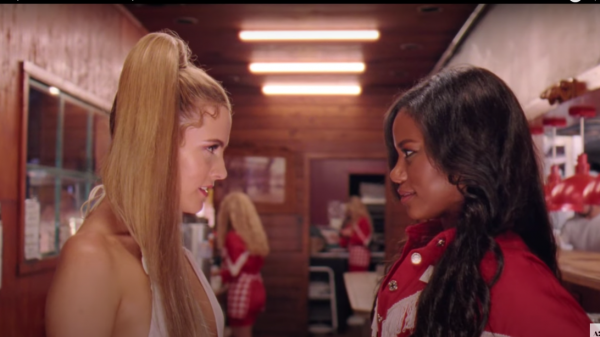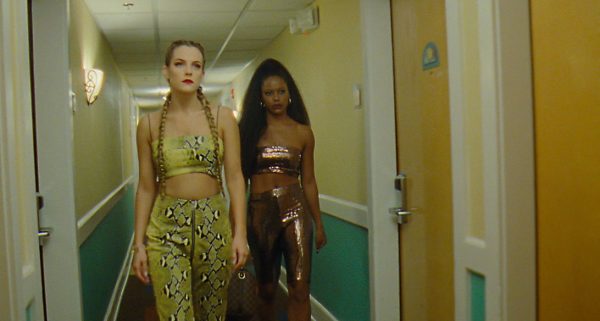Film Review: “Zola” — Fear and Posting in Tampa, Florida
By Nicole Veneto
Zola is an exhilaratingly salacious odyssey through the neon-lit strip clubs, dingy motels, and gaudy underbelly of America’s chaos state, like Showgirls as told by Zora Neale Hurston.
Zola, directed by Janicza Bravo.

Stefani (Riley Keough) and Zola (Taylour Paige) in Zola. Photo: A24.
If you’ve been wondering where I’ve been for the past two months, the long and short of it is that a housemate situation in the apartment I just moved from got so ugly that I had to leave and stay with family for awhile. Like any young person with a social media outlet to vent on, I alluded to what this person put our household through — a selfish pandemic-pet adoption I took responsibility for, $500 heating bills, gaslighting and manipulation — as it happened because I needed external confirmation that what was happening was as unfathomably ridiculous and toxic as I experienced it.
After moving the bulk of my things into my new apartment last week, I went to the Boston Common AMC for the first time since COVID to see a film I’ve been eagerly anticipating since its Sundance 2020 premiere. If you were terminally online back in 2015, you probably remember #TheStory, a viral 148-tweet thread written by former waitress and exotic dancer Aziah “Zola” King about a “hoe trip” she took to Florida gone horribly, outrageously wrong. On October 27 at 9:32 pm, King tweeted a photoset of herself and a white woman named Jessica with this juicy opener: “Y’all wanna hear a story about why me & this bitch here fell out?! It’s kinda long but full of suspense.” What followed was a wryly told, (mostly) true account of Zola’s brush with a Nigerian pimp’s sex trafficking scheme, taking readers on a salacious odyssey through the neon-lit strip clubs, dingy motels, and gaudy underbelly of America’s chaos state, like Showgirls as told by Zora Neale Hurston. Enthralling everyone from Solange Knowles to Ava DuVernay, #TheStory epitomized a new form of storytelling only possibly through social media: the Tweetstorm.
I knew going in that Zola was going to be a raucous good time, and all the better to watch with an audience. What I hadn’t expected was to find my own fresh emotional trauma mirrored and validated when I needed it most. Directed by Janicza Bravo (2017’s cringe-comedy Lemon) and written for the screen by Bravo and playwright Jeremy O’Harris (Slave Play, Daddy), the film version of #TheStory stays (mostly) faithful to King’s original Twitter thread. As with any movie adaptation, certain details are embellished for big-screen spectacle, and the relatively short source material means incorporating outside sources (including a Reddit thread from Jessica, renamed Stefani in the movie, about her version of events). But what Bravo and O’Harris have done is pure magic: translating a 148-Tweet-storm into an exhilarating narrative feature while retaining King’s authorial voice throughout the creative process and in the film itself. Zola shouldn’t just walk away with every Best Adapted Screenplay accolade come awards season — it’s the best film of the year, period.
Bravo sets the stage for this doomscroll through Instagram’s Inferno against the playful twinkling of a harp. The story opens in medias res, as Zola (Taylour Paige, Boogie) and Stefani (Riley Keough, Mad Max: Fury Road) fix their makeup and primp their hair in a mirrored room. Don’t mistake this for female vanity — these women are putting on warpaint, preparing for a night that’ll go six ways to Sunday before dawn breaks. Zola’s narration kicks off with the now infamous line, “Y’all wanna hear a story about why me and this bitch here fell out?” and cuts back a few days to their fateful meeting. While waiting tables at a cowboy-themed Hooters knock-off, waitress Zola catches the eye of Stefani, who seems to intuitively know that Zola’s real line of work is pole dancing. Stefani’s abrasive abuse of AAVE and minstrelsy mannerisms are offputting, but Zola nonetheless finds common ground over their shared experience as erotic dancers. The next day, Stefani invites Zola on a weekend road trip trip to Florida to dance at a high-paying upscale strip club, accompanied by her milquetoast boyfriend Derrek (Succession’s Nicholas Braun) and nameless “roommate” X (Euphoria’s Colman Domingo, in another career-high performance), her pimp.
Visually, Zola is nothing short of sumptuous. Shot on 35mm (not digital), the cinematography perfectly melds film stock’s tangible texture with iPhone interfaces and glossy Instagram aesthetics. (Kubrick’s The Shining is an unexpected but thematically fitting influence.) This is matched by the sound design: pings, blips, and tweeting chirps are the rhythmic background noise, just as they are in our ever-connected offline lives. And Oscar-nominated composer Mica Levi (Under the Skin, Jackie) brings their signature discordant notes and chopped-and-screwed melodies to underline the ever-escalating chaos. All these sensory delights make Zola a must-see in theaters.

Stefani (Riley Keough) and Zola (Taylour Paige) in Zola. Photo: A24
While I loved Zola’s vibrancy and lively sense of humor (reality star Ts Madison delivers the best film monologue since Robert Shaw in Jaws), the moment that solidified Zola as a year’s best arrived when Zola confronts Stefani for dragging her to Florida under false pretenses. Trapped in a hotel room where X expects them to turn tricks, Zola unloads on Stefani with all the exasperated outrage I felt in my bones over the past several months: “This is messy! You are messy! Your brain is broke!” What’s often forgotten about #TheStory is that it functioned as a way for the real Zola (then 19) to process the fucked up situation she was lured into.
Zola is a headstrong, self-assured young woman who treats dancing as a passion (“I came here to dance!”) and work that is both physically and emotionally demanding. Nonetheless, Paige’s performance also bestows a vulnerability to Zola not outwardly evident in King’s original thread. At one point, everything becomes so overwhelming that she begins disassociating, her mind turning into a bioluminescent Mac screensaver.
Although the film doesn’t outright condemn Stefani/Jessica, Zola lampoons a certain type of woman who narcissistically performs “victimhood” to manipulate those around her, feigning ignorance to maintain the center of gravity around herself. Unsurprisingly, this behavior is typically associated with white femininity, and Bravo is a virtuoso when it comes to satirizing white women’s neurotic fragility (her short Woman in Deep is a case study of this). There’s a clever meta-awareness in Keough’s casting, considering her grandfather, Elvis Presley, arguably appropriated Black culture into a whitewashed rock and roll legacy. Keough plays Stefani with all the loud-mouthed bravado of Bhad Bhabie on network television, demanding Dr. Phil “cash her outside.” It’s simultaneously a great comedic performance that reveals the total void of identity at Stefani/Jessica’s core.
Am I kinda annoyed A24 made us wait a year and a half to experience Zola? Somewhat, but had I watched it this time last year (before my own troubles began) I don’t think it would have had the same impact for me. Part of the reason I love cinema is that feeling you get when a movie seems to speak to your very soul, giving expression to an experience shared by many but which we often feel alone in. What more can I say other than bravo Janicza, bravo.
Nicole Veneto graduated from Brandeis University with an MA in Women’s, Gender, and Sexuality Studies, concentrating on feminist media studies. Her writing has been featured in MAI Feminism & Visual Culture, Film Matters Magazine, and Boston University’s Hoochie Reader.

In the early nineties I witnessed that Tampa underground, Mon Venus.